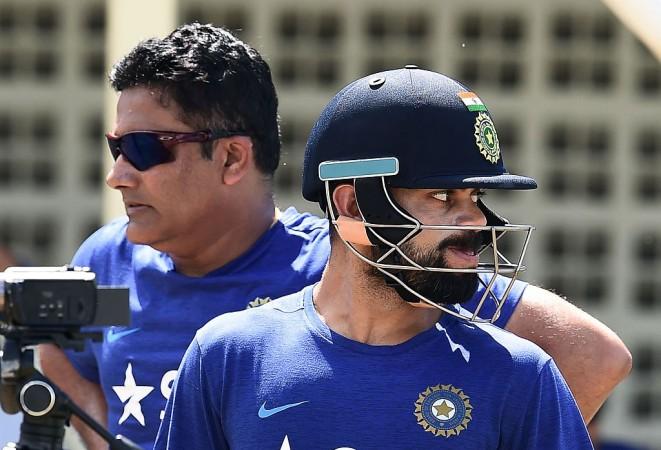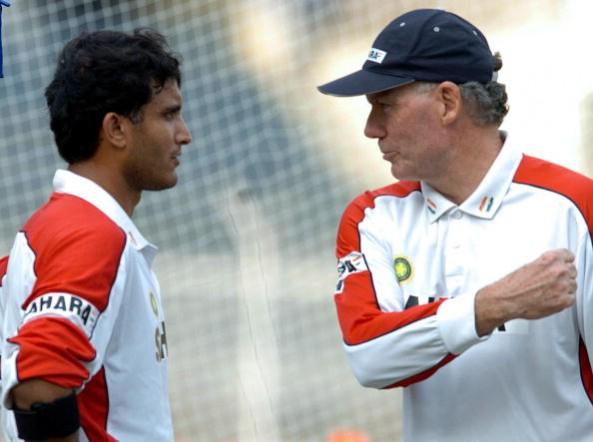![Ramachandra Guha (extreme right) [representational image] Ramachandra Guha, Ramachandra Guha resigns, Indian cricket, BCCI. CoA, Committee of Administrators](https://data1.ibtimes.co.in/en/full/648801/ramachandra-guha-ramachandra-guha-resigns-indian-cricket-bcci-coa-committee-administrators.jpg?w=699&h=443&l=50&t=40)
My father is an ex-cricketer. He had played a few matches for Bengal in Ranji Trophy in the 1970s and 1980s. Though he could not make it to play Test cricket, something he was kin to do, he never took the game lightly. Even today, he searches the gallis of rural areas of Bengal for young talents and does whatever he can in his capacity to produce cricketers for tomorrow.
But what I am saying about my father in an article which is related to my profession?
It is related to the latest fracas in India's cricketing circles: the reported rift between captain Virat Kohli and coach Anil Kumble and the resignation of cricket historian Ramachandra Guha from the committee of administrators protesting over several issues pertaining to the functioning of the BCCI.
Guha is a man of forthright and balanced vision
Guha, who is known for his forthright and balanced views, has slammed the cricket governing body's way of handling things and also criticised a number of former cricketers and captains over conflict of interest. He wrote everything he found objectionable in a seven-page letter to Vinod Rai, head of the committee.
Guha, for instance, has questioned the justification of granting a Grade A Central Contract despite the fact that he is not part of the national Test team any more.
This particular questioning by Guha reminds me of my father's modest struggle to produce cricketers from the remotest areas.
"Indians love superstar culture and this creates a divide between the present and the future," the man, who himself was associated with Kolkata's posh cricket academies once but left them later feeling that money and status were getting more dues than the actual thing: talent. "I see many cheat people for money and teach nothing. This shameless commercialisation is not for people like me," he used to say, before kick-starting his old scooter to reach the practice ground.

Today, when I see a man of reputation like Guha also express his frustration over an unjustified superstar culture which appropriates even a player like Mahendra Singh Dhoni who is perhaps a captain to have originated from the most humble of backgrounds, my father's words ring a bell, yet again. Cricket, for a generation, is still romanticism. While for others, it's a glamour world.
If Indian players can't adjust with an Indian coach, why blame Greg Chappell?
Guha has also spoken about his disappointment with the BCCI's handling of the speculated Kohli-Kumble rift. He was not happy that the BCCI was looking for a new coach despite the fact that Kumble has a solid track record. Now, if the Indian players cannot adjust with an Indian coach, what was the big fuss with Greg Chappell's controversial coaching? Here again, I remember my father making a remark in the wake of the Chappell controversy.
"The Australians have a different work ethic. And since we Indians are more concerned about stardom and ego-massaging, it is very unlikely that Chappell was not going to have it easy," he had said, also asking: "Why it is that only Sourav Ganguly is speaking out against Chappell? Why people like Sachin Tendulkar doesn't also come up with their versions and show a team solidarity? Isn't it their team?"

As a Bengali, my father must have felt that a fellow Bengali was being unjustly criticised for speaking out his mind, but when Guha also accused the committee of remaining silent and taking no action, saying it was "unfortunately being complicit in this regard", I hear my father words being uttered again: "Isn't it their team?"
We are afraid to speak up in public fearing backlash. We don't know why really Tendulkar had taken so much time to let his opinion on Chappell but when we see Guha's team also not backing him on a key issue, it is understood that Indians prefer a particular culture where the mask is more valuable than the face.
Victorian values have long eroded, dear Ram Guha
One may also accuse Guha of backing Kumble and Javagal Srinath [who he suggested as his replacement in the committee], both from Karnataka where Guha lives, but that doesn't reduce the significance of the points he has raised.
As a cricket historian who has a strong knowledge about the evolution of the beautiful game and the Victorian values that were once its inherent part, Guha has found the practices of the captain using a "veto power" on issues like appointing a coach or even a member in the commentators' panel extremely annoying.
But then again, the cricket that we witness today is more a business of the big boys and not a poetic rendezvous between two superbly skilled opponents as it was. Expecting the ideals to unfold both on and off the ground today is an error Guha committed though one cannot really hold the intellectual in him responsible for the error.
The risk of failure of the noble men [and one woman too], who came to run India's cricket administration in a transparent way, was always high for there is a massive sea of divide between what it should be like and what it is.
Both for my father, who was disillusioned with the mundane world of cricket and took up things on his own shoulders to make the squirrel's contribution, and Guha, there are way too many 'Whys' to be answered. But who really is going to do that work?














